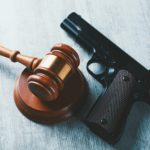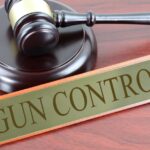Owning a firearm comes with great responsibility, especially in New Jersey where strict laws govern their possession. Understanding the consequences of illegal firearm possession is crucial to staying on the right side of the law. In this article, Eastcoastlaws.com will explore the penalties individuals may face for unlawfully possessing firearms in the Garden State. Let’s delve into the legal landscape surrounding illegal firearm possession in New Jersey and shed light on the potential repercussions individuals may encounter if they fail to comply with the state’s firearm laws.
Penalties for Illegal Firearm Possession in New Jersey Overview
Firearm possession charges encompass a range of offenses, with potential for facing multiple charges depending on the nature of the crime. These can include:
- Unlawful possession of weapons, applicable if found in possession of a firearm without the necessary permit.
- Unlawful possession of illegal weapons, relating to specific firearms prohibited in the state.
- Certain persons not permitted to have weapons, relevant if possessing a firearm while designated as ineligible.
- Possession of a weapon for unlawful purposes, if found with a firearm intending to use it unlawfully.
- Possession of a firearm during the commission of a CDS/bias crime, if discovered with a firearm during a drug-related or intimidation offense.
Each offense carries its own set of penalties, with severity potentially escalating if falling under the Graves Act. Given such legal complexities, seeking guidance from a seasoned New Jersey gun possession lawyer is crucial. A proficient attorney can elucidate your rights and advocate for your freedom effectively.
Unlawful Possession
The sort of firearm you were found in possession of will determine the consequences for unlawful possession. Without a firearms ID card, possessing a rifle or shotgun carries a maximum fine of $15,000 and a sentence of three to five years in prison. Illegal gun ownership without a permit to carry is a second-degree offense punishable by up to $150,000 in fines and five to ten years in jail. The Graves Act applies to unlawful handgun possession, and a minimum obligatory jail sentence is imposed.
Unlawful Possession of an Illegal Weapon
In New Jersey, it is illegal to own certain types of guns under any conditions. A conviction is regarded as a third-degree offense, carrying a maximum sentence of five years in jail and a fine of fifteen thousand dollars.
Certain Persons Conviction
If you are found in possession of a firearm and you have a prior conviction, you might face a minimum of five years in prison and possibly even ten years in prison before being granted parole.
Possession of a Firearm for an Unlawful Purpose
In addition, it is a second-degree offense that carries a maximum $150,000 fine and a maximum sentence of five to ten years in jail for illegal firearm possession. It is also covered by the Graves Act.
What is Considered a Weapon in New Jersey?
The term “weapon” in New Jersey refers to more than just knives and traditional guns. As per legal definition, a weapon is any object that can be easily used to cause death or serious injury to a person. This wide meaning can apply to a variety of objects, including—surprisingly—a person’s fists. In New Jersey, blunt weapons intended for fighting, such as blackjacks, blunt clubs, and blunted pistols, are specifically categorized as weapons. Additionally included are brass or metal knuckles, which increase the power of a blow. The list also includes cestasuses, an archaic weapon made of leather bands studded with metal filings or wood-embedded razor blades.
Bladed weapons with the ability to do serious harm, such stilettos, daggers, dirks, and gravity knives, are classified as weapons. Switchblade Knives are especially noteworthy because of their unexpected and covert lethality, which is achieved by spring-loaded blades. Naturally, firearms are on the list because of their inherent capacity for death. Stun guns are considered weapons despite their intended function of incapacitating rather than killing targets due to their potential for severe physical harm.
And last, in New Jersey, even some unconventional objects—like slingshots and sand clubs—are regarded as weapons. These objects can cause serious harm, despite the fact that they may be viewed as simple objects or even toys in some situations.
New Jersey Graves Act
The state of New Jersey takes weapons offenses very seriously, and there have been numerous cases where innocent individuals have been incarcerated due to the state’s strict gun laws. These laws are encompassed in a section of the law known as the Graves Act, which imposes severe penalties on individuals convicted of possessing certain weapons. The Graves Act is defined within the New Jersey Criminal Code, specifically referenced as N.J.S.A. 2C:43-6.
According to the Graves Act, individuals who are discovered with a firearm or commit specific crimes while possessing a firearm are subject to mandatory minimum prison sentences. Consequently, those convicted of a Graves Act offense must serve a minimum of one-third to one-half of their sentence, or a minimum of 42 months (whichever is longer), before they become eligible for parole.
The Graves Act covers various prohibited weapons that carry substantial penalties, including:
- Handguns
- Rifles
- Machine guns
- Shotguns
- Sawed-off shotguns
- Defaced firearms
Specific offenses that fall under the Graves Act include:
- Unlawful possession (without a permit, license, or registration) of machine guns, handguns, rifles, or shotguns, classified as a second-degree offense.
- Possessing a sawed-off shotgun is categorized as a third-degree offense. Owning a defaced firearm, classified as a fourth-degree offense.
- Possessing a firearm during the commission of an offense involving controlled dangerous substances (CDS) is classified as a second-degree offense.
- Possessing a firearm as a prohibited person, classified as a second-degree offense.
Additionally, according to the Graves Act, engaging in activities such as manufacturing, transporting, or disposing of machine guns, sawed-off shotguns, or assault firearms is classified as a third-degree offense. Similarly, defacing firearms is also considered a third-degree offense.
If you have specific questions about the Graves Act or need further information, it is recommended to consult with a New Jersey Graves Act lawyer. At Lustberg Law Offices, our lawyers can provide you with the guidance and representation you need if you are facing charges or have concerns related to the Graves Act. Contact us today to schedule a free consultation.
Possession of a Firearm During the Commission of a CDS or Bias Offense
Carrying a firearm while committing these activities is regarded as a second-degree crime. Additionally, jail term must be served consecutively if there is a second conviction for possessing a handgun for an illegal purpose.
| Firearms Possession Charges in New Jersey | Penalty |
|---|---|
| Unlawful Possession of Rifle/Shotgun | 3 to 5 years in prison and fines up to $15,000 |
| Unlawful Possession of Handgun | Second-degree crime: 5 to 10 years in prison and fines up to $150,000 |
| Unlawful Possession of Illegal Weapon | Third-degree crime: 3 to 5 years in prison and fines up to $15,000 |
| Possession of Firearm for Unlawful Purpose | Second-degree crime: 5 to 10 years in prison and fines up to $150,000 |
| Possession of Firearm During CDS or Bias Offense | Second-degree offense, additional conviction for unlawful purpose requires consecutive prison sentences |
What Does The State Need to Prove in Order to Charge Someone With Possession Of a Weapon for an Unlawful Purpose?
The State must demonstrate both that the defendant intended to use the weapon against another person or piece of property and that they had it with the intent to use it illegally in order to convict someone of possession with an unlawful purpose. Weapons that can be illegally owned include pistols, rifles, shotguns, imitation firearms, explosives, and more, as stated in N.J.S.A. 2C:39-1.
The degree of an unlawful purpose violation depends on the kind of weapon employed. The accused’s sentence, including whether a mandatory minimum sentence or an assumption of incarceration would be applied to their case, will also depend on the type of weapon used in the offense. The accused may be required to serve time in prison and fulfill extra obligations as stipulated by the Graves Act in order to comply with the law.
It is crucial to get the immediate legal assistance of a skilled New Jersey criminal defense attorney if you are accused of possessing an illegal firearm. You might be able to keep your freedom and your rights intact with the aid of an accomplished attorney.





